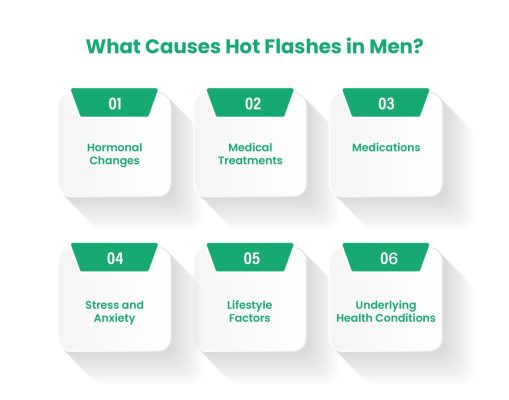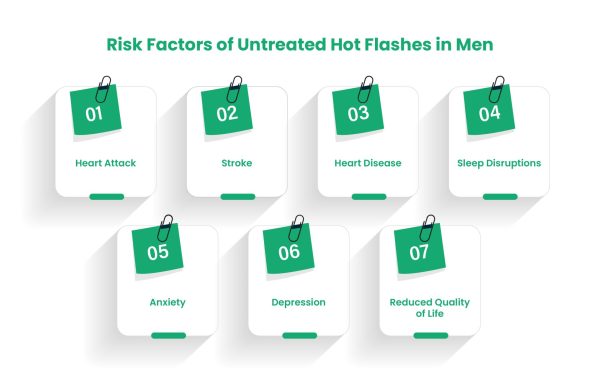Hot flashes, often associated with menopause in women, can also affect men, catching many by surprise. These sudden, intense waves of heat, typically lasting between two to thirty minutes, can leave individuals drenched in sweat and feeling disoriented.
Research indicates that hot flashes in men may be linked to hormonal changes, particularly decreased testosterone levels. These episodes, although uncomfortable, are usually harmless.
However, understanding their causes and managing their symptoms can significantly improve the quality of life.
What are Hot Flashes?
Hot flashes are sudden and intense feelings of warmth that can spread over the face, neck, and chest, often accompanied by sweating and a rapid heartbeat. While commonly associated with female menopause, these episodes can also occur in men, particularly as they age and experience hormonal changes.
This phenomenon, often referred to as male menopause, involves fluctuations in testosterone levels that can trigger these unexpected heat surges. The result is not only physical discomfort but also potential disruption to daily activities and sleep patterns.
Is it Normal for Men to Have Hot Flashes?
It is entirely normal for men to experience hot flashes, although it may come as a surprise to many. These episodes are often linked to hormonal changes, particularly a decline in testosterone levels, a condition sometimes referred to as andropause or male menopause.
Just like in women, these hormonal shifts can lead to sudden bouts of intense heat and sweating. While less commonly discussed, hot flashes in men are a recognized medical condition, and acknowledging their prevalence can help in seeking appropriate treatment and managing symptoms effectively.
If you are experiencing hot flashes, it is important to consult with a healthcare provider to understand the underlying causes and explore potential solutions.
What Causes Hot Flashes in Men?
Hot flashes in men are typically caused by hormonal fluctuations, particularly a decrease in testosterone levels. This condition, known as andropause or male menopause, can lead to a variety of symptoms, including hot flashes.
Other factors that may contribute to hot flashes in men include lifestyle choices, medical treatments, and underlying health conditions. Here are some common causes:
- Hormonal Changes: Decrease in testosterone levels during male menopause.
- Medical Treatments: Certain cancer treatments, such as hormone therapy for prostate cancer.
- Medications: Some medications can trigger hot flashes as a side effect.
- Stress and Anxiety: Psychological factors can exacerbate the occurrence of hot flashes.
- Lifestyle Factors: Poor diet, lack of exercise, and excessive alcohol or caffeine consumption.
- Underlying Health Conditions: Conditions like obesity or thyroid disorders can contribute to hot flashes.
Can High Blood Pressure Cause Hot Flashes in Men?
While high blood pressure itself is not a direct cause of hot flashes in men, it can exacerbate the frequency and intensity of these episodes. Hypertension can lead to increased stress on the cardiovascular system, which may trigger or intensify hot flashes.
Additionally, medications used to treat high blood pressure can have side effects that include sweating and flushing, mimicking the symptoms of hot flashes. Therefore, managing blood pressure effectively is crucial for overall health and may help reduce the severity of hot flashes.
It’s important for men experiencing both high blood pressure and hot flashes to consult their healthcare provider to explore the best treatment options and ensure comprehensive care.
Treating and Preventing Hot Flashes in Men
Managing hot flashes in men involves a combination of lifestyle changes, medical treatments, and home remedies. By understanding the triggers and implementing effective strategies, men can significantly reduce the frequency and intensity of these uncomfortable episodes.
Lifestyle Changes
Adopting a healthier lifestyle can play a crucial role in reducing hot flashes.
- Regular Exercise: Engaging in physical activity helps regulate hormones and reduce stress.
- Balanced Diet: Eating a diet rich in fruits, vegetables, and whole grains can stabilize blood sugar and hormones.
- Avoiding Triggers: Identifying and avoiding specific triggers like spicy foods, caffeine, and alcohol.
- Stress Management: Practicing stress-reducing techniques such as yoga, meditation, or deep breathing exercises.
Medical Treatments
For some men, medical treatments may be necessary to manage severe hot flashes.
- Hormone Replacement Therapy (HRT): Replaces declining testosterone levels to alleviate symptoms.
- Medications: Certain medications, such as antidepressants or anti-seizure drugs, can help manage hot flashes.
- Consultation with a Healthcare Provider: Regular check-ups to monitor hormone levels and adjust treatments as needed.
Home Remedies
Simple home remedies can also provide relief from hot flashes.
- Cool Environment: Keeping the living and sleeping areas cool to prevent overheating.
- Hydration: Drinking plenty of water throughout the day to stay hydrated.
- Layered Clothing: Wearing layers that can be easily removed when a hot flash occurs.
- Natural Supplements: Using supplements like vitamin E, black cohosh, or soy products, after consulting with a healthcare provider.
Risk Factors of Untreated Hot Flashes in Men
Ignoring or not treating hot flashes in men can lead to several health complications and negatively impact overall well-being. Persistent hot flashes can be more than just an uncomfortable experience; they can signal underlying health issues and lead to more severe consequences.
- Heart Attack: Chronic stress from untreated hot flashes can increase the risk of heart attacks.
- Stroke: The strain on the cardiovascular system can elevate the likelihood of strokes.
- Heart Disease: Prolonged hormonal imbalance and stress may contribute to the development of heart disease.
- Sleep Disruptions: Frequent hot flashes can lead to insomnia or poor sleep quality, affecting overall health.
- Anxiety: The unpredictability and discomfort of hot flashes can cause or worsen anxiety.
- Depression: Persistent symptoms can lead to feelings of helplessness and depression.
- Reduced Quality of Life: The physical and emotional toll of untreated hot flashes can significantly diminish the quality of daily life and overall well-being.
How Long Do Male Hot Flashes Last?
The duration of hot flashes in men can vary significantly from person to person. Typically, a single episode can last from a few seconds to several minutes, with the average duration being around four minutes.
However, the overall period during which men experience hot flashes can span months or even years, depending on the underlying causes and individual health factors.
Factors such as hormonal imbalances, particularly decreased testosterone levels, and certain medical treatments can influence the frequency and longevity of hot flashes.
Closing Note
Men, especially those experiencing hormonal changes such as decreased testosterone levels, can and do experience hot flashes. These episodes can significantly impact daily life and overall well-being, but with proper understanding and management through lifestyle changes, medical treatments, and home remedies, men can find relief and improve their quality of life. If you or someone you know is experiencing hot flashes, consulting a healthcare provider can provide personalized strategies and support.



